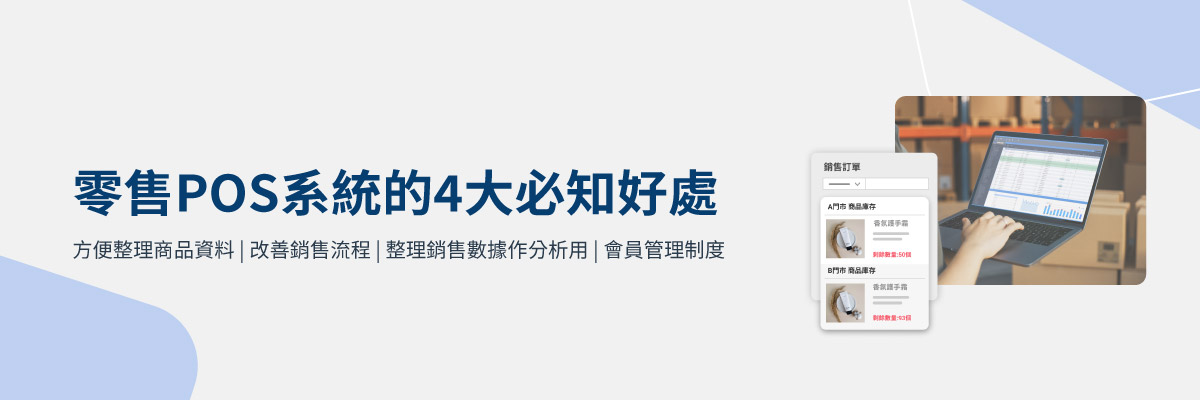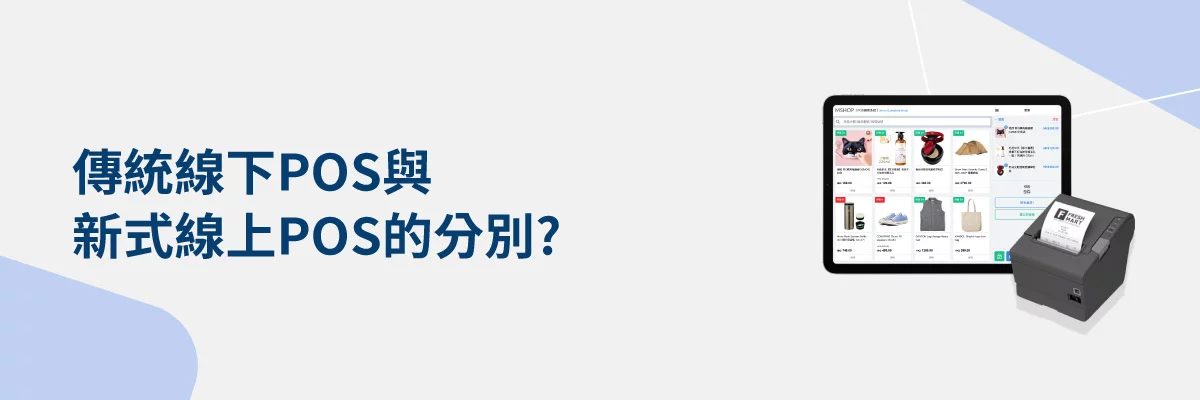
【What is a POS system?】2024 Retail POS System Recommendations and 4 Key Benefits.
In this issue of Mshop’s E-commerce Classroom, we’ll explore what a POS system is, its basic functions, and its applications in various industries. We’ll also delve into the benefits of retail POS, the differences between traditional and modern online POS systems, and provide tailored recommendations for retail POS systems based on different needs.
What is a POS system?
A POS system (Point of Sale System), is an electronic system used for managing sales, inventory, employees, and other aspects of a business. It typically consists of hardware equipment (such as a computer, cash register, printer, etc.) and software applications that help merchants conduct sales and manage their operations more efficiently. Common features of a retail POS system include cash handling, electronic payments, and order settlement functions.
Overview of the basic functions of POS system
An excellent POS system typically has the following key functions:
1. Sales Management:
The POS system can process sales data, record sales information, and generate sales reports, making it convenient for businesses to analyze their sales performance.
2. Inventory Management Integration:
The POS system can integrate with inventory management, allowing real-time tracking of inventory levels and automatic updates to prevent stockout or excess stock.
3. Employee Management:
Utilizing a POS system enables businesses to assign employee roles, record employee performance, and facilitate assessment and training.
4. Membership Management Integration:
The POS system can synchronize membership information, allowing businesses to establish customer profiles, issue membership cards or loyalty points, and enhance customer loyalty.
5. Multiple Payment Method Support:
The POS system supports various payment methods, ensuring secure and fast transactions.
Application of POS systems in different industries
POS systems can be applied in various industries, including retail, food and beverage, hospitality, and service industries. Different industries may have specific functionalities in their POS systems to meet their unique needs. For example, the retail industry focuses on the payment process, the service industry emphasizes reservation management, and the food and beverage industry emphasizes table ordering functions. However, the basic principles and functionalities remain similar across industries. This article will primarily focus on introducing retail POS systems.
4 Benefits of retail POS system

For the retail industry, choosing a suitable retail POS system can bring several benefits:
Retail POS Benefit 1: Convenient Management of Product Information
A retail POS system allows you to quickly organize your product information, such as product names, prices, and inventory levels. Additionally, through the use of SKU (stock-keeping unit) or barcodes, products can be categorized efficiently, enabling merchants to locate items quickly and improve service speed and efficiency. Furthermore, a suitable POS system can help merchants gain better insights into sales performance and set minimum stock levels for each item, facilitating timely inventory adjustments.
Retail POS Benefit 2: Improved Sales Process
A retail POS system streamlines the sales process through automation, resulting in faster checkouts and reduced manual errors. Moreover, the POS system can generate sales documents such as receipts or invoices swiftly. It can also facilitate the quick registration of customers as members, allowing them to enjoy exclusive membership benefits and providing a more professional service experience. Simplifying the sales process not only enhances customer satisfaction but also enables employees to focus on delivering better customer service.
Retail POS Benefit 3: Data Organization for Analysis
A retail POS system can collect and organize various sales data, such as daily sales revenue, popular products, and customer buying habits. This data can be utilized to analyze sales trends and market demands, assisting businesses in formulating more effective sales strategies. Additionally, through data analysis, businesses can gain better insights into employee performance and implement appropriate rewards or training programs.
Retail POS Benefit 4: Membership Management System
A retail POS system provides comprehensive membership management functionality, enabling businesses to establish a customer database, issue membership cards or loyalty points, and enhance customer loyalty. Through a membership system, businesses can target customers with personalized promotions and information on new products, thereby increasing customer retention. Furthermore, membership data can be used to analyze customer preferences and purchasing behavior, allowing businesses to further enhance customer satisfaction.
Comparison between Traditional Offline POS Systems and Modern Online POS Systems:
What are the differences?

Traditional offline POS systems primarily rely on hardware devices such as cash registers and printers. While these systems can meet basic requirements in terms of functionality, they have limitations in terms of data synchronization and remote management. Here are some advantages and disadvantages of traditional POS systems:
The modern online POS system, such as Mshop POS, is a contemporary solution specifically designed for the retail industry. It incorporates advanced features and capabilities to streamline retail operations. With its comprehensive retail functionalities, it seamlessly integrates and synchronizes online and offline data in real-time, enabling efficient management of data from multiple sources.
Summary: How to Choose the Right Retail POS System?
For small to medium-sized retail businesses (with up to five branch stores), we recommend using the Mshop Retail POS system. Compared to general online POS systems, the Mshop Retail POS system offers a simpler user interface and better data synchronization functionality, making it an ideal choice for small to medium-sized retailers.
However, for retail businesses with higher POS demands, such as those that frequently require queue management, inventory adjustments, returns, and exchanges, we suggest opting for a traditional POS system.
Due to the increasing emphasis on O2O/OMO (Online-to-Offline/Online Merge Offline) retail models, we recommend that businesses can utilize a traditional POS system and integrate it with the Mshop online store system through APIs. This allows enterprises to manage all online and offline (O2O and OMO) retail data easily within a single system, providing customers with an integrated shopping experience and reducing the complexities associated with managing multiple systems (e.g., overselling inventory, unsynchronized customer data).
Mshop Retail POS System
Mshop Online Retail POS system provides hardware support, including barcode scanners, receipt printers, and cash registers. It offers features such as data synchronization between online and offline channels, membership programs, and a mobile app for in-store pickup, all with a focus on simplicity and ease of use. With Mshop, your colleagues can quickly adapt and efficiently manage daily store operations, enabling the implementation of the OMO (Online Merge Offline) retail model.
To learn more about the features of our retail POS system, we invite you to schedule a free consultation for setting up an online store. Experience the convenience of Mshop’s all-in-one solution, combining an online store, mobile app, and in-store POS system.
Related Articles
.【Open an Online Shop in 2024】: 4 Steps & Common E-commerce FAQs
・【Online Store Success】4 Customer Acquisition Strategies from Top Merchants
・【E-commerce Sourcing】Popular Product Sources & Channels | Pros & Cons


